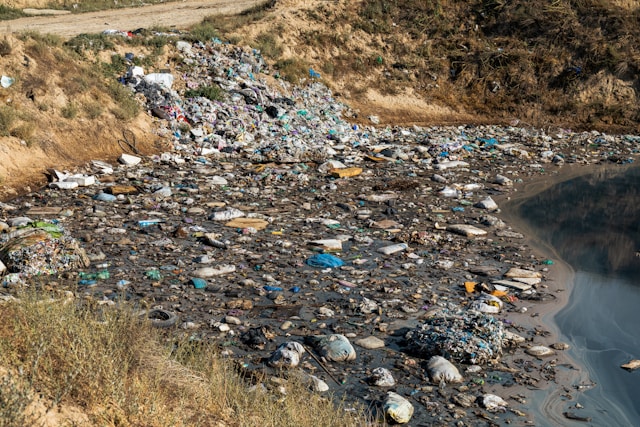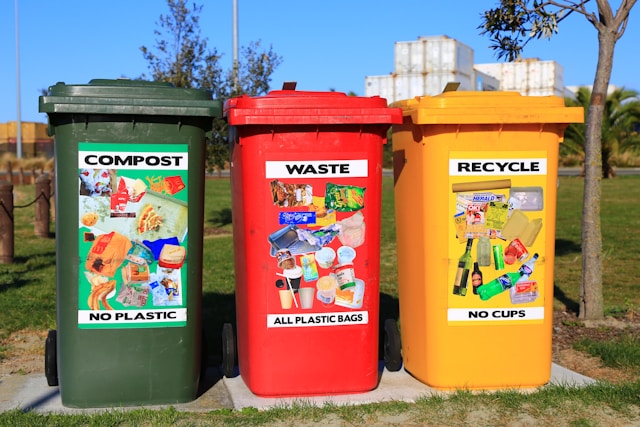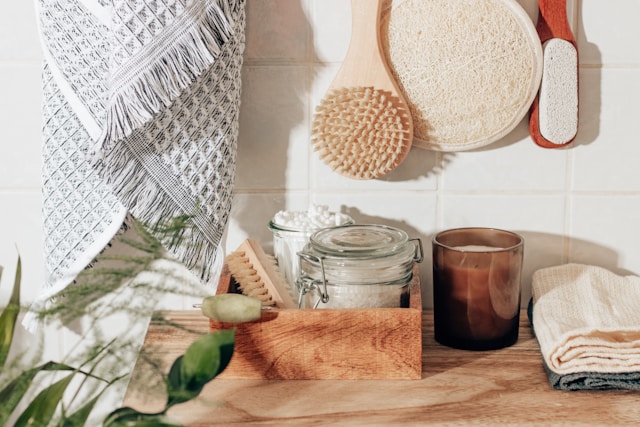Zero Waste Living: A Practical Guide to Getting Started
Our planet is indeed burdened by waste. Landfills are brimming, oceans are suffocating with plastic, and our resources are depleting. However, the zero-waste movement is not a distant dream but a tangible reality, urging us to reconsider our relationship with material possessions and embrace a more sustainable lifestyle. While achieving ‘zero’ waste may seem like a lofty goal, significantly reducing our waste output is a practical and impactful step we can all take

This comprehensive guide equips you with the knowledge and practical steps to embark on your zero-waste journey. We’ll explore the core principles, introduce the handy “5 R’s” framework, and provide actionable tips you can implement in various aspects of your daily life. Remember, this is a marathon, not a sprint. Celebrate small wins, forgive occasional slip-ups, and enjoy becoming a more responsible consumer.

Why Go Zero Waste?
Embracing a zero-waste lifestyle is not just about having a cleaner bin. It’s about reaping a multitude of benefits that extend far beyond the surface. Here are some compelling reasons to dive into the world of zero-waste:

Environmental Impact: Landfills leach harmful chemicals, incinerators release greenhouse gasses, and excessive resource extraction damages ecosystems. Reducing waste lessens our ecological footprint and protects the planet for future generations.
Consider the staggering statistics: Every year, Americans alone throw away over 30 million tons of food waste [source: Environmental Protection Agency]. This decomposing food releases methane, a 25 times more potent greenhouse gas than carbon dioxide at trapping atmospheric heat. We can significantly contribute to combating climate change by reducing food waste and composting scraps.
Resource Conservation: Every item we discard represents resources—water, energy, and raw materials—that have been needlessly consumed. Zero-waste practices encourage the responsible use of these finite resources.
Did you know? It takes roughly 700 gallons of water to produce just one cotton t-shirt [source: World Wildlife Fund]. By extending the lifespan of our clothing through proper care and repair, we can conserve precious water resources.
Living a zero-waste lifestyle is beneficial for the environment and our finances: By avoiding unnecessary purchases, fixing things that are broken instead of buying new ones, and opting for reusable alternatives, we can significantly reduce our long-term expenses. We can start by looking at our grocery bills and evaluating how much we spend on single-use items such as plastic bags and water bottles. It may seem like a small amount, but investing in reusable alternatives can save us a considerable amount of money in the long run.
Healthier Living: Minimizing processed and packaged foods often means opting for fresh, whole foods, which are generally better for your health. Additionally, reducing dependence on single-use plastics lowers exposure to harmful chemicals.
Studies have linked Bisphenol A (BPA), a chemical in many plastic products, to various health concerns, including hormonal imbalances and certain cancers [source: National Institutes of Health]. By choosing reusable alternatives, you can safeguard your health.
The 5 R’s: A Framework for Zero-Waste Living
The zero-waste philosophy is guided by the “5 R’s” – a hierarchy of practices that help us minimize waste at every stage:

- Refuse: This is the most crucial step. Say no to things you don’t need. Politely decline freebies, unsubscribe from unwanted mail, and avoid impulse purchases. Ask yourself, “Do I truly need this, or will it end up in the trash?”
- Reduce: Focus on consuming less overall. Buy only what you genuinely need, choose products with minimal packaging, and opt for durable, long-lasting items.
- Reuse: Give new life to old items. Repair broken things, use refillable containers, and get creative with repurposing.
- Recycle: Once you’ve exhausted the refuse, reduce, and reuse options, recycle properly. Understand what your local recycling program accepts and ensure that items are correctly sorted.
- Rot: Compost food scraps and yard waste to create nutrient-rich soil for your garden. This diverts organic matter from landfills and reduces methane emissions.
Getting Started: Practical Steps for Everyday Life
Now that you understand the core principles let’s translate them into actionable steps you can take in various aspects of your daily life
The Kitchen
- Embrace reusables: Invest in reusable grocery bags, produce bags, and containers. Bulk stores often allow you to bring your containers, reducing packaging waste. This might require an initial investment, but these reusables will last for years, saving you money and reducing waste in the long run.
- Shop smart: Choose items with minimal packaging or choose package-free alternatives at local farmers’ markets. Look for products with minimal cardboard or plastic, and consider buying in bulk to reduce the number of containers needed.
- Get creative with leftovers: To keep leftovers from languishing in the fridge, repurpose them into new dishes (think leftover chicken transformed into a pot pie or stir-fry) or freeze them for later use. Leftover planning can be part of your meal planning process—cook slightly larger quantities, knowing you’ll have another meal out of them.
- Embrace composting: Compost food scraps like vegetable peels, fruit cores, eggshells, coffee grounds, and tea leaves. Composting transforms these scraps into nutrient-rich soil that you can use to nourish your houseplants or garden. Countertop composting options exist for small apartments, or you can set up a larger bin outdoors.

Beyond the Kitchen:
Moving beyond the Kitchen, here are some practical tips for minimizing waste in other areas of your life:
The Bathroom:
- Ditch disposables: Swap disposable razors for safety razors with replaceable blades. These safety razors last years, and replacement blades are significantly cheaper and generate less waste.
- Embrace bar soaps and shampoos: Switch to bar soaps and shampoos that eliminate plastic bottles. Bar soaps often last longer than their bottled counterparts and frequently come packaged in minimal or recyclable cardboard. Look for local, handmade options that offer package-free refills.
- Consider reusables: Consider reusable menstrual products like menstrual cups or period underwear. While there might be an initial learning curve, these options are good for the environment and can save you money in the long run.
- Reduce cotton swabs and wipes: Opt for reusable cotton swabs made of silicone or bamboo. You can switch to washable cloth wipes for makeup removal or general cleaning.
- DIY cleaning solutions: Make your own with vinegar, baking soda, and essential oils. These natural ingredients are effective cleaners and disinfectants, eliminating the need for harsh chemicals stored in plastic bottles.
On-the-Go:
- Hydration hero: Carry a reusable water bottle and coffee mug to avoid single-use disposables. Invest in a good quality water bottle and coffee mug that you’ll enjoy using and carry wherever you go. This eliminates the need to purchase bottled water or takeout coffee cups.
- Pack brilliant lunches: Pack your lunch in reusable containers and utensils. Pack your meals in containers that are the right size to avoid food waste, and opt for reusable utensils made from stainless steel or bamboo instead of plastic disposables.
- Say no to bags: Bring your shopping bags for unplanned purchases. Keep a few reusable shopping bags folded up in your purse or car so you’re always prepared to decline plastic bags at the store.
- Stash a straw and cutlery: Invest in a reusable straw and cutlery set for takeout meals. Many restaurants still offer plastic utensils with takeout orders, so having your own set ensures you’re not contributing to that waste stream.
- Refuse produce bags: Refuse single-use plastic bags for produce items at grocery stores. Many stores allow you to place loose produce directly into your reusable bags or use trim, reusable produce bags made from mesh or cotton.
Additional Tips:
- Support sustainable businesses: Support businesses that prioritize sustainability. Look for stores that offer package-free options, refill stations for household products, and products made from recycled materials. By supporting these businesses, you send a message that there’s a demand for sustainable practices.
- Get creative with repurposing: Think outside the box when giving old items new life. Turn old clothes into cleaning rags, use glass jars for storage, and transform old containers into planters.
- Embrace minimalism: Adopt a minimalist mindset to reduce the amount of stuff you bring into your home. Only purchase what you truly need and love, and consider donating or selling items you no longer use.
- Educate and inspire: Share your zero-waste journey with others. Talk to friends and family about the benefits of reducing waste and encourage them to adopt eco-friendly habits. You can also join online communities or local zero-waste groups to connect with like-minded individuals.

Resources:
- Zero Waste Home by Bea Johnson: You can purchase or learn more about Bea Johnson’s book on websites like Amazon or Barnes & Noble.
- The Minimalist Way by Joshua Becker: This book is available on major book-selling platforms such as Amazon and Barnes & Noble. You might also find it at your local bookstore.
- Trash is for Tossers by Lauren Singer: Visit the blog at Trash is for Tossers where Lauren provides tips, DIY projects, and zero waste lifestyle guidance.
- The Story of Stuff: You can watch the documentary and access related materials on their official website at The Story of Stuff Project. The film is also available on platforms like YouTube for easy viewing.
Conclusion
As we conclude our journey towards a zero-waste lifestyle, it’s important to remember that each small step is part of a much larger movement towards sustainability. For further inspiration and practical tips, visit our homepage or explore more within our categories, such as Zero Waste, Sustainable Home and Garden, Sustainable Lifestyle, and Ethical Fashion. Each section offers valuable resources and insights to help you live a greener life.
Adopting a zero-waste lifestyle is more than just about waste reduction; it’s a journey of personal growth and conscious decision-making that aligns with your values of environmental preservation and sustainable living. Explore our articles on sustainable home improvements or ethical fashion choices to delve deeper into the topics that resonate with you. Let’s continue to evolve together, making sustainable choices and nurturing a healthier planet.
Remember, every change, no matter how small, has a ripple effect. By joining us in our commitment to a cleaner, greener future and staying informed and proactive in your sustainable lifestyle choices, you are contributing to a larger movement. Together, we can pave the way for a sustainable future, one decision at a time.

